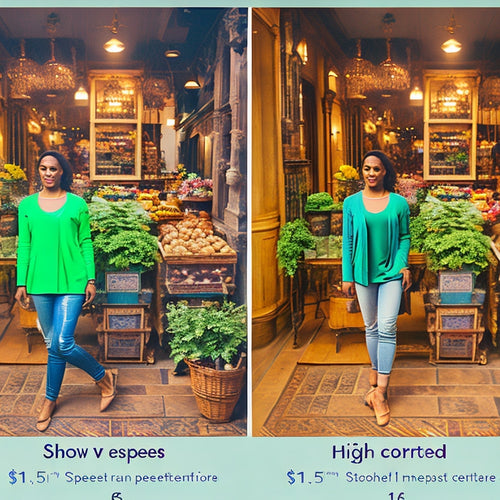
What's the Best Platform for Digital Product Sales?
Share
You require a digital product platform that aligns with your business goals, resonates with your target audience, and drives sales and revenue growth. Key factors that are crucial encompass user-friendliness, customization capabilities, and intuitive user experiences. Assess payment processing, transaction costs, and transparent pricing models to maximize revenue. Remember to examine security and compliance measures, integration capabilities, and scalability for handling high transaction volumes. With a plethora of choices available, it's vital to balance your priorities and evaluate the pros and cons of each platform. Now, explore how to make an informed decision that boosts your digital product sales ahead.
Key Takeaways
• Align the platform with your business objectives, marketing strategies, and target audience preferences for optimal digital product sales.
• Evaluate the platform's ease of use, customization capabilities, and user experience to effectively sell digital products.
• Analyze the platform's payment processing, transaction costs, and pricing models to optimize revenue and minimize costs.
• Ensure the platform integrates with your existing tools and systems, and can handle high transaction volumes and peak traffic.
• Prioritize flexibility in design and customization to adapt to changing market demands and customer needs.
Popular Digital Product Platforms
You have a plethora of choices when it comes to popular digital product platforms, each catering to specific needs and preferences.
When choosing the best platform for your digital product sales, it's crucial to take into account your marketing strategies and customer engagement goals.
For example, if you're concentrated on creating a loyal customer base, you may prefer a platform that provides strong email marketing tools and loyalty programs.
Conversely, if you aim to outperform competitors, you'll want to select a platform that offers detailed competitive analysis and market trend insights.
Ease of Use and Customization
When selecting a digital product platform, its ease of use and customization capabilities are pivotal factors to consider, as they significantly impact your ability to effectively manage and optimize your online store. You want a platform that provides an intuitive user experience, allowing you to focus on selling digital products rather than struggling with the platform itself.
Look for design options that cater to your brand's unique identity, such as customizable templates, layouts, and themes. This will enable you to create a cohesive and engaging online store that resonates with your target audience.
In terms of customization, you'll want a platform that offers flexibility and control over the user experience. This might include features like drag-and-drop builders, CSS editing, and API access. A platform that strikes the right balance between ease of use and customization will empower you to create a tailored experience that meets your customers' needs and exceeds their expectations.
Payment Processing and Fees
When selecting a platform for digital product sales, you'll want to carefully examine the payment processing and fees associated with each option.
You'll need to crunch the numbers to determine which platform offers the most competitive transaction costs, and whether their fee structure aligns with your business model.
Transaction Cost Analysis
Evaluating the transaction cost of each platform is essential, as payment processing fees can greatly eat into your profit margins. When analyzing digital product sales platforms, you need to take into account the fees associated with each transaction. This includes the percentage taken by the platform, payment gateways, and any additional charges.
To optimize your revenue, you'll want to choose a platform with competitive pricing strategies that align with your market research.
Here are three key factors to contemplate:
-
Transaction fees: What percentage of each sale goes towards payment processing?
-
Payment gateway fees: Are there additional fees for using specific payment gateways, such as PayPal or Stripe?
-
Discount rates: Are there any discounts for bulk transactions or loyalty programs?
Fee Structure Comparison
To maximize your profit margins, you need to carefully examine the fee structures of various digital product sales platforms, considering the nuances of payment processing and fees that can greatly impact your bottom line.
A thorough fee structure analysis is essential to make sure you're not sacrificing your hard-earned revenue to excessive charges. When comparing platforms, look for transparent pricing models that align with your business needs.
Conduct a price comparison to identify the most cost-effective option for your digital product sales. Consider the transaction fees, payment processing rates, and any additional charges that may apply.
Revenue optimization is key, and even small percentage variances in fees can add up over time. Be sure to calculate the total cost of ownership, including any setup fees, subscription costs, and support expenses.
Security and Compliance
One essential aspect of digital product sales platforms you should scrutinize is their security and compliance measures, particularly in payment processing, to safeguard your customers' sensitive data is protected and your business is shielded from potential legal and financial liabilities.
When evaluating a platform's security, consider the following key factors:
-
PCI-DSS compliance: Confirm the platform adheres to the Payment Card Industry Data Security Standard, which sets a high bar for data protection.
-
Encryption and access controls: Verify that the platform uses robust encryption and access controls to protect sensitive customer data.
-
Regular security audits and penetration testing: Look for platforms that regularly conduct security audits and penetration testing to identify and address vulnerabilities.
Integration and Compatibility Options
How seamlessly your digital product sales platform integrates with existing tools and systems can greatly impact your business's overall efficiency and profitability. You'll want to make sure that your chosen platform can overcome compatibility challenges and offer a range of integration options. This is especially important if you're using cross-platform solutions or require software integration with other business systems.
Here's a breakdown of what to take into account:
| Integration Aspect | Key Considerations |
|---|---|
| API Access | Does the platform offer API access for custom integrations? |
| Third-Party Integrations | Are there pre-built integrations with popular tools like CRMs or marketing automation software? |
| Software Compatibility | Is the platform compatible with different operating systems and browsers? |
| Data Import/Export | Can you easily import and export data between systems? |
| Custom Development | Are there resources available for custom development and integration? |
Customer Support and Services
You'll also need to evaluate the level of customer support and services offered by the digital product sales platform, as timely and effective assistance can make all the difference in resolving technical issues and maximizing sales potential.
When choosing a platform, consider the following essential support features:
-
24/7 Assistance: Look for platforms that offer round-the-clock assistance through multiple channels, such as phone, email, and live chat. This guarantees that you can get help whenever you need it, without downtime or delay.
-
Tailored Support: Opt for platforms that provide tailored support, such as dedicated account managers or priority support tickets. This type of assistance can help you resolve complex issues more efficiently and effectively.
-
Extensive Resource Centers: A platform's resource center should be comprehensive and easily accessible, featuring guides, tutorials, and FAQs that can help you troubleshoot common issues and get the most out of the platform's features.
Scalability and Growth Potential
When choosing a platform for digital product sales, you're not just thinking about your current needs, you're thinking about your future growth.
You'll want a platform that offers room for expansion, can handle high volumes of sales, and provides flexibility in design to adapt to changing market demands.
As you scale up, your platform should be able to keep pace, ensuring that your business can reach its full potential.
Room for Expansion
As your digital product business takes off, you'll need a platform that can seamlessly scale with your growth, handling increased traffic and sales without compromising performance or customer experience. This means choosing a platform that can adapt to your evolving needs, whether that's integrating new payment gateways, adding product lines, or expanding into new markets.
To secure room for expansion, consider the following key factors:
-
Market research integration: Can the platform easily incorporate market research tools, allowing you to stay ahead of customer demand and identify new opportunities?
-
Strategic partnerships: Does the platform facilitate partnerships with other businesses, enabling you to tap into new markets and expand your reach?
-
API access and customization: Can you access the platform's API to customize and extend its functionality, ensuring a tailored solution that meets your unique needs?
Handling High Volume
To handle high volume sales, look for a platform that can efficiently process a large number of transactions, guaranteeing that your digital product business can scale rapidly without technical glitches or downtime. When evaluating platforms, consider those that prioritize performance optimization to guarantee a seamless customer experience. This is essential, as slow loading times or errors can lead to abandoned carts and lost sales.
A scalable platform should have load balancing capabilities to distribute traffic across multiple servers, guaranteeing that no single server becomes overwhelmed and slows down your site. Additionally, the platform should have sufficient server capacity to handle sudden spikes in traffic, such as during promotions or holiday seasons. This guarantees that your site remains responsive and available to customers, even during peak periods.
Flexibility in Design
Your platform's design should accommodate your business's growth by allowing you to easily modify and customize its layout, theme, and functionality to adapt to changing market demands and customer needs. This design flexibility is essential in today's fast-paced digital landscape, where businesses need to evolve quickly to stay competitive.
To achieve this, you'll want a platform that offers robust customization options, allowing you to:
-
Tailor your storefront's layout and design to showcase your products in a way that resonates with your target audience.
-
Easily update your theme and branding to reflect changes in your business strategy or brand identity.
-
Integrate third-party apps and services to enhance your store's functionality and provide a seamless customer experience.
Frequently Asked Questions
Can I Sell Licensed or Copyrighted Digital Products on These Platforms?
When selling digital products, you'll need to navigate licensing restrictions and guarantee copyright protection to avoid legal implications that infringe on intellectual property rights, so it's important to understand the terms and conditions of each platform you use.
Are There Any Restrictions on the Types of Digital Products I Can Sell?
When selling digital products, you'll encounter content restrictions, impacting your profit potential. Some platforms prohibit explicit, offensive, or misleading content, while others have stricter guidelines for certain niches, so reviewing each platform's policies before listing your products is crucial.
Can I Use My Own Domain Name With These Digital Product Platforms?
You're building a digital empire, and a custom domain is the crown jewel. Yes, most platforms offer domain integration, allowing you to brand your storefront while providing customization options, but be aware of selling limitations and copyright infringement risks.
Are There Any Digital Product Platforms With Built-In Affiliate Programs?
You'll find platforms like Gumroad, Sellfy, and Easy Digital Downloads offering built-in affiliate programs, enabling you to manage affiliate marketing, track referrals, and set commission rates, while also providing customizable affiliate links for seamless integration.
Do These Platforms Provide Analytics and Sales Tracking Tools?
You're drowning in a sea of sales data, but fear not! These platforms provide you with analytics and sales tracking tools to monitor your sales performance, user behavior, and conversion rates, giving you the insights you need to optimize and thrive.
Related Posts
-
Enhancing Online Shopping: Introducing Vimotia's Shoppable Video Experience
Vimotia Shoppable Videos UGC is a cutting-edge app that revolutionizes the online shopping experience by introducing ...
-

How to Do Shopify Optimization
Shopify optimization is a crucial aspect of achieving e-commerce success. By implementing effective strategies, onli...
-

What Is the Best Automation Tool for Shopify
This article examines the topic of identifying the most effective automation tool for Shopify. It explores the benef...

